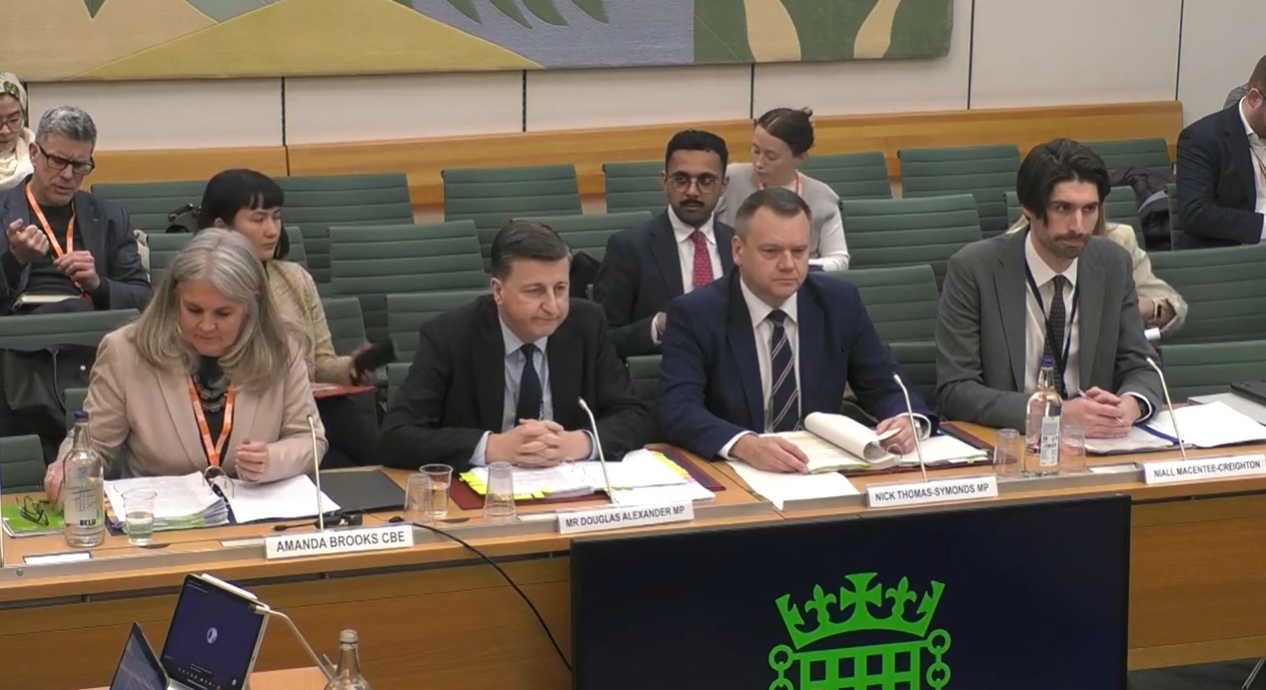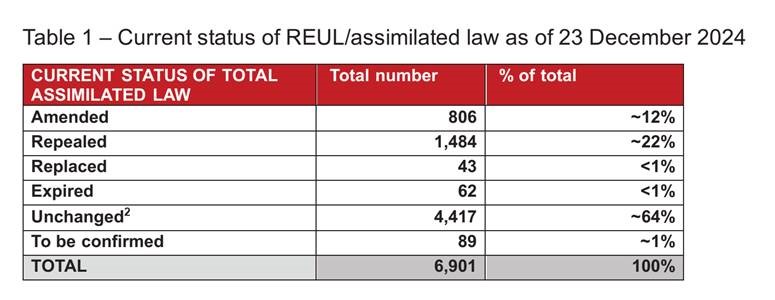Brexit & Beyond newsletter
28 January 2025
Welcome to the 28 January 2025 Brexit & Beyond newsletter
Last Monday the Secretary of State for Northern Ireland wrote to the Speaker regarding the Stormont Brake decision. The following day he provided an update to the House of Commons.
At the Assembly, the Committee for Agriculture, Environment and Rural Affairs secured an extension to the Committee Stage of the Agriculture Bill until 23 May 2025. The Windsor Framework Democratic Scrutiny Committee agreed and published two reports for its inquiries into two published replacement EU Acts.
The UK Government has launched a 10-week consultation as part of a review into the UK Internal Market Act.
At Westminster, the House of Commons Business and Trade Committee launched its inquiry into export-led growth by taking oral evidence from Douglas Alexander MP, Minister for Trade Policy and Economic Security and Nick Thomas-Symonds MP, Minister for Constitution and European Relations. The House of Lords European Affairs Committee heard from three academics as part of its inquiry into the UK-EU relationship.
- Stormont Brake
- Agriculture Bill
- Windsor Framework Democratic Scrutiny Committee
- Export-led Growth
- UK Government launches UK Internal Market Act consultation
- Pan-Euro Mediterranean Convention (PEM)
- European Affairs Committee Inquiry into UK-EU Relations
- The outcome of the democratic consent vote in the Northern Ireland Assembly
- Assimilated Law Parliamentary Report
- EU Commission and Irish Farmers
- Other news
Stormont Brake
Last Monday, the Secretary of State for Northern Ireland, Hilary Benn MP responded to written notification from 30 MLAs seeking to prevent the application of the Chemical Classification, Labelling, and Packaging Regulation in Northern Ireland. He acknowledged “genuine and sincere consideration of the issues” by Assembly Members and the Windsor Framework Democratic Scrutiny Committee, emphasizing the importance of Northern Ireland's voice in such matters.
The Secretary of State confirmed the procedural requirements were met, with consultation efforts noted despite limited responses. While industry data could not be fully shared due to confidentiality, the government highlighted that the regulation primarily extends existing requirements, not creating new hazard classes, and includes transition periods for adaptation.
The Secretary of State’s view was that the claim that the Amending Regulation would significantly impact Northern Ireland’s communities was not supported, as existing regulatory differences have not previously disrupted trade. He stated that most UK businesses already align with EU standards, mitigating risks of supply chain issues. The UK government pledged to consult on aligning UK-wide chemical labelling regimes to prevent new barriers and safeguard the UK internal market.
The Secretary expressed commitment to addressing concerns and invited Members and the public to contribute to an upcoming consultation to ensure smooth market operations and Northern Ireland’s integration.
The next day, the Secretary of State provided an update to the House of Commons. He reassured Members that the UK Government, in response to concerns raised in the notification, will take necessary steps to prevent new barriers within the UK internal market caused by chemical classification, labelling, and packaging regimes. This includes consulting on a consistent UK-wide regime, if required, to protect market integrity.
Agriculture Bill
The Agriculture Bill will grant the Department for Agriculture, Environment and Rural Affairs (DAERA) the authority to make fruit and vegetable aid funding discretionary and amend assimilated laws related to legacy EU Fruit and Vegetable Aid (FVAS) and Food Promotion programs.
Last week, the Committee for Agriculture, Environment and Rural Affairs requested an extension to the Committee Stage until 23 May 2025 to allow for detailed scrutiny, evidence gathering, and stakeholder engagement. Chair Robbie Butler MLA cited the Bill’s complexity, limited consultation feedback, and potential sectoral impacts as key reasons for the request.
The Minister for Agriculture did not oppose the motion but urged swift progress, warning that the extension could delay the Bill’s completion before the summer recess, impacting DAERA’s ability to set funding priorities for the next three years.
The Assembly agreed to extend the Committee Stage of the Agriculture Bill. You can find out more on the Committee’s scrutiny of the legislation here
Windsor Framework Democratic Scrutiny Committee
Last week the Windsor Framework Democratic Scrutiny Committee agreed and published two reports for its inquiries into two published replacement EU Acts:
- Regulation (EU) 2024/3115 regarding plant health controls and reporting obligations
- Regulation (EU) 2024/3110 laying down harmonised rules for the marketing of construction products and repealing Regulation (EU) No 305/2011
Regulation (EU) 2024/3115 amends Regulation (EU) 2016/2031 (the ‘Plant Health Regulation’), as listed in the Windsor Framework. The Plant Health Regulation is the basic legal framework for EU plant health policy. It establishes protective measures against pests, including rules on classification criteria for pests; requirements for imports and movements of plants in the EU; and reporting and certification obligations.
It also amends Regulation (EU) 2017/625 (the ‘Official Controls Regulation’). The Official Controls Regulation regulates the movement of plants, plant health and protection products. Together these regulations constitute the EU system of risk management and import controls for plants, plant products, and related material.
The replacement EU act aims to improve the application and enforcement of the Plant Health Regulation and the Official Controls Regulation, by streamlining and simplifying reporting requirements, and promoting standardised and digitalised procedures.
The Committee focused on two key conditions that must be met for the Stormont Brake to be triggered. First, it determined that the replacement EU act does not significantly differ in content or scope from the EU instruments it amends. Second, the Committee concluded that the replacement EU act would not have a lasting, significant impact on the everyday lives of communities in Northern Ireland.
Regulation (EU) 2024/3110 which lays down harmonised rules for the marketing of construction products, is a replacement EU act as it repeals and replaces Regulation (EU) 305/2011, the Construction Products Regulation, which is listed in Annex 2 of the Windsor Framework.
In reaching its conclusions, the Committee focused on two key conditions that must be met for the Stormont Brake to be pulled. Having considered its commissioned legal advice, the Committee concluded that the replacement EU act significantly differs, in part, from the content and scope of the EU instrument which it replaces. However, having considered the evidence received from the UK Government, the Department of Finance, the Department for Infrastructure and the Department of Agriculture, Environment and Rural Affairs, as well as other stakeholders, the Committee concluded that the replacement EU act would not have a significant impact specific to everyday life of communities in Northern Ireland in a way that is liable to persist.
Export-led Growth
Last Tuesday, the House of Commons Business and Trade Committee launched its inquiry into export-led growth by taking oral evidence from Douglas Alexander MP, Minister for Trade Policy and Economic Security, Department for Business and Trade and Nick Thomas-Symonds MP, Minister for Constitution and European Relations, Cabinet Office.
 Douglas Alexander MP, Minister for Trade Policy and Economic Security, Department for Business and Trade and Nick Thomas-Symonds MP, Minister for Constitution and European Relations, Cabinet Office give evidence to the Business and Trade Committee
Douglas Alexander MP, Minister for Trade Policy and Economic Security, Department for Business and Trade and Nick Thomas-Symonds MP, Minister for Constitution and European Relations, Cabinet Office give evidence to the Business and Trade Committee
The Minister for Constitution and European Relations gave the Committee more information about the Government’s approach to the UK-EU reset. He highlighted the appointment of Michael Ellam to the role of second permanent secretary at the Cabinet Office, focusing on the EU-UK reset. He set out three interrelated pillars:
- Security Pillar: This focuses on geostrategy and foreign policy cooperation. It emphasizes structured and regular collaboration between the UK and the EU, involving both politicians and officials. This aims to address modern challenges through enhanced dialogue and coordination, building on existing informal cooperation since the UK left the EU.
- Safety and Law Enforcement Pillar: This prioritises the protection of citizens and effective law enforcement collaboration. Key elements include real-time data sharing with Europol, combating crimes such as drug trafficking, money laundering, terrorism, and human smuggling. Special attention is given to partnerships with the EU, France, and the Calais group, as well as the role of the newly created Border Security Command in working with continental neighbours.
- Trade Pillar: This pillar integrates trade with political stability to encourage investment. Key priorities include negotiating a sanitary and phytosanitary agreement, achieving mutual recognition of professional qualifications to bolster service exports, and improving mobility for touring artists in the EU. It underscores the interconnectedness of trade, political stability, and broader UK-EU relations.
The Minister for Constitution and European Relations stressed the need for “a bespoke SPS agreement that is suitable for the United Kingdom” and its interests. He confirmed that the first post-Brexit UK-EU summit will take place before the end of June.
The Minister for Trade Policy and Economic Security told the Committee that UK exports to the EU are now 8% lower than they were in 2018 (which he identified as the most recent stable, pre-Brexit, pre-covid year for comparison). UK imports from the EU are 2% lower. He noted that they are discovering that “Brexit has not only inhibited cross-channel trade to the European Union, but risked making the UK a more closed economy.”
He told Members that services trade has surpassed expectations, as it was less impacted by new border-related barriers. It has helped maintain overall trade figures and aligns with a global trend of increasing demand for services.
The Ministers discussed the Product Regulation and Alignment Bill and described it as a framework that enables future governments to update regulations as needed, rather than committing to specific policies or alignment strategies.
UK Government launches UK Internal Market Act consultation
Last Thursday, the UK Government launched a 10-week consultation as part of a review of the UK Internal Market Act (UKIMA). The UKIMA contains a statutory requirement for a Government review to be completed by December 2025. However, the Government has committed to complete it by summer 2025.
Minister of State for Trade Policy Douglas Alexander said:
“We are announcing a review of the UK Internal Market Act that will move faster, be completed earlier and be wider in scope than required in law.
We have listened to concerns raised in recent years over the operation of the UK Internal Market Act and will ensure that Devolved Governments and businesses with an interest can contribute and make their voice heard.
Throughout the consultation, which will last 10 weeks, the UK Government will engage closely with the devolved governments and interested parties, on how we ensure the Act is fit for the future in a new era of collaboration across the board, improving the operation of the UK Internal Market Act.”
The Government has stated “The UK Government will not be repealing the [UK Internal Market] Act or reviewing the part of the Act with relevance to Northern Ireland. This is because the Act contains vital provisions concerning the Windsor Framework and Northern Ireland’s place in the UK internal market, and the UK Government has been clear that we will protect this.”
Pan-Euro Mediterranean Convention (PEM)
Speaking at the World Economic Forum in Davos, Maroš Šefčovič, who led post-Brexit negotiations for the European Union, has told the BBC a "pan-European [customs] area is something we could consider" as part of "reset" discussions between the UK and EU.
The Pan-Euro-Mediterranean Convention (PEM) essentially streamlines the procedures around rules of origin which are integral to Free Trade Agreements in a process known as cumulation. Signatories to the PEM can benefit from the broadening of what counts as ‘local content’ when it comes to rules of origin, thus potentially allowing more exporters to trade with the EU tariff free. You can read the EU’s explainer on the PEM here
After meeting Maroš Šefčovič in Davos, the UK Business Secretary Jonathan Reynolds reportedly described Mr Šefčovič’s comments as “incredibly positive” and “helpful”, and suggested joining the Pan-Euro-Mediterranean Convention (PEM) could be acceptable as it “is not a customs union”. Mr Reynolds said: “We can improve the terms of trade with the EU in a way which doesn’t revisit customs unions or single markets or the arguments of Brexit, and we can do that whilst pursuing closer trade links around the world.”
Asked on Sky News’s Sunday Morning with Trevor Phillips programme whether she would take up Šefčovič’s offer, Chancellor Rachel Reeves said she was “absolutely happy” to look at taking part in the PEM. Last year, the Centre for Inclusive Trade Policy looked at the case for whether the UK should join the PEM, finding that the data suggests that joining PEM ‘would not be a game-changer for UK exports to the EU’.
European Affairs Committee Inquiry into UK-EU Relations
Last Tuesday, the House of Lords European Affairs Committee heard from three experts as part of its inquiry into the UK-EU relationship:
- Armida Van Rij, Senior Research Fellow and Head of the Europe Programme at Chatham House
- Wolfgang Münchau, Co-founder and Director of Eurointelligence
- Mujtaba Rahman, Managing Director for Europe at Eurasia Group
Armida Van Rij highlighted a lack of clarity in the UK’s strategic vision for its relationship with the EU and what it seeks to offer. She emphasized the importance of defence and industrial cooperation as areas where progress could be made.
Wolfgang Münchau pointed out that the US presidential election and Germany’s upcoming election are pivotal events. He noted that Friedrich Merz, a potential German Chancellor, could invigorate UK-EU relations if elected. Merz has proposed a defence procurement union, but defence is currently excluded from EU treaty law.
Mujtaba Rahman encouraged the UK to adopt a more ambitious strategy, particularly in the context Donald Trump’s second term as US president. He suggested that Trump’s presidency could prompt the European Commission to focus on strategic priorities like defence and energy, moving away from contentious issues like fishing and migration.
The outcome of the democratic consent vote in the Northern Ireland Assembly
Yesterday, (Monday 27 January), the UK Government published an exchange of letters between the UK and EU on the outcome of the democratic consent vote in the Northern Ireland Assembly. On 12 December 2024, Nick Thomas-Symonds MP, wrote in his capacity as Co-Chair of the UK/EU Withdrawal Agreement Joint Committee to Maroš Šefčovič, his EU counterpart. Responding on 8 January 2025, Maroš Šefčovič highlighted “the continued importance of the full, timely, and faithful implementation of all the elements of the Windsor Framework and … the need for continuous efforts in order to achieve it.”
Assimilated Law Parliamentary Report
Last Thursday, the UK Government published its Assimilated Law Parliamentary Report for June to December 2024. The Retained EU Law (Revocation and Reform) Act 2023 (the REUL Act) requires the Government to publish biannual reports (until June 2026) on the steps it has taken to revoke or reform assimilated law (formerly known as retained EU law or REUL). Retained EU law was legislation which had been made in the UK to implement EU obligations while the UK was a member state of the EU. Once the UK had left the EU, it became the responsibility of the UK Parliament and the devolved legislatures to decide whether to revoke or reform this type of law, noting the effect on alignment with or divergence from EU law. The Government’s latest report and tracker dashboard shows that Government is currently tracking a total of 6,901 items of assimilated law across approximately 400 policy areas.
 The current status of REUL/assimilated law as of 23 December 2024 is as follows: 806 laws amended, 1,484 repealed, 43 replaced, 62 expired, and 4,417 retained
The current status of REUL/assimilated law as of 23 December 2024 is as follows: 806 laws amended, 1,484 repealed, 43 replaced, 62 expired, and 4,417 retained
EU Commission and Irish Farmers
Last Thursday, on his first official visit to the Republic of Ireland as EU Commissioner for Agriculture and Food, Christophe Hansen told attendees at the Irish Farmers’ Association 70th AGM that he wants farming to be sustainable economically as well as environmentally. RTE reports that “he was greeted with applause when he said that it was not fair the EU imports agricultural products treated with products that were not allowed to be used by farmers within the EU.”

EU Agriculture and Food Commissioner Hansen meeting representatives from Irish food, farming and environmental organisations in Dublin
According to Agriland, Commissioner Hansen also strongly highlighted issues on generational renewal when it comes to farming across Europe and why there must also be a “sustainable” future for farming, not just environmentally but also from an economic perspective.
Other news
- This week the EU will challenge the UK’s ban on catching sandeel, celebrated by conservationists, and argue it amounts to discrimination against Danish fishers.
- On Thursday, Micheál Martin was confirmed as Taoiseach in the Dáil. Following his first call to Prime Minister Keir Starmer since his election, Taoiseach Martin said: “we are both committed to making 2025 an important and defining year for Irish-British relations as we initiate a series of annual summits to drive a programme of strategic cooperation between our two countries.” The first in an agreed new series of annual Ireland-UK summits will be hosted by the UK in March. The two will next meet on 3 February at an informal meeting of the European Council in Belgium.
- Politico reports that Tesla has joined three Chinese manufacturers in suing the European Commission in court in Luxembourg over duties on made-in-China electric vehicles. Despite being headquartered in the US, Tesla makes most of its vehicles intended for Europe in China. The cars also have Chinese batteries inside.




